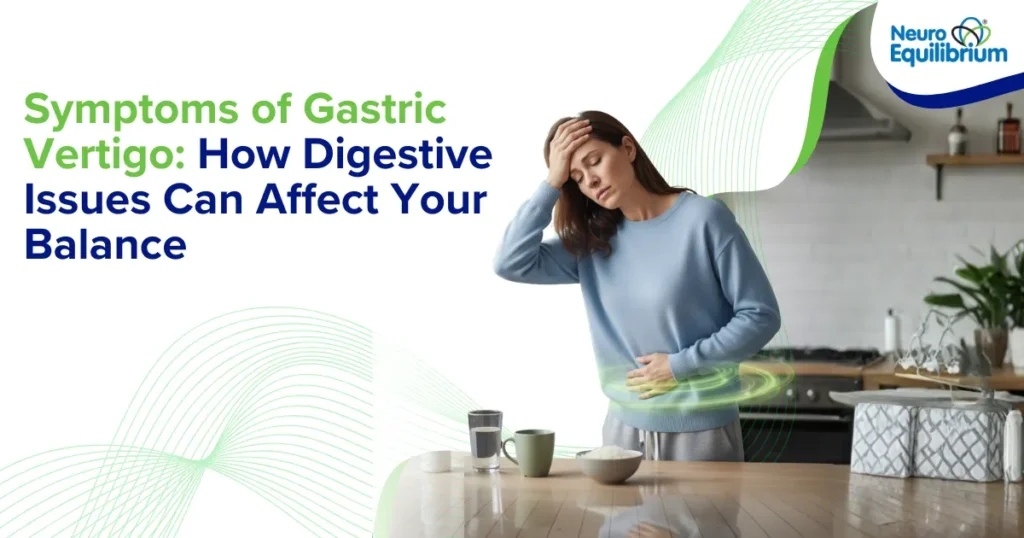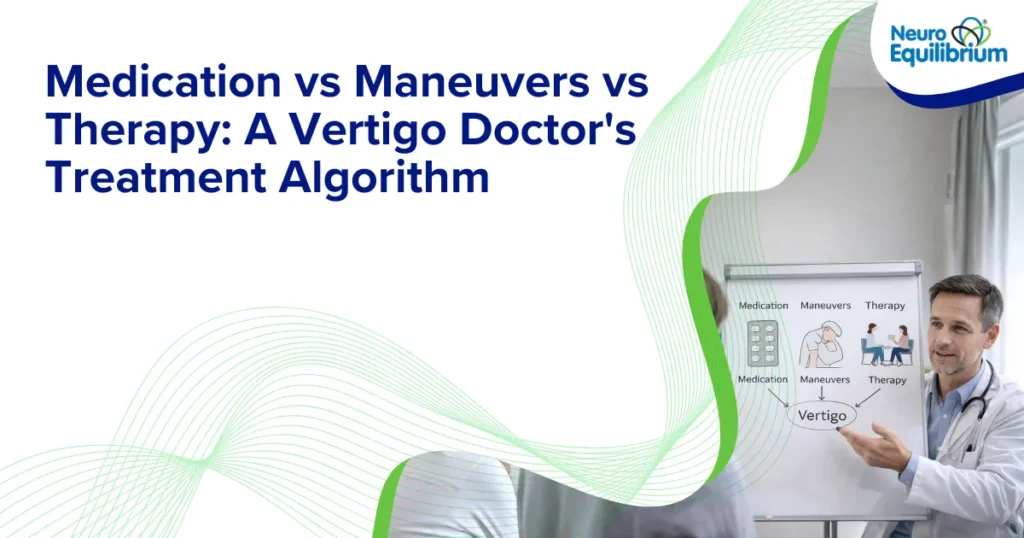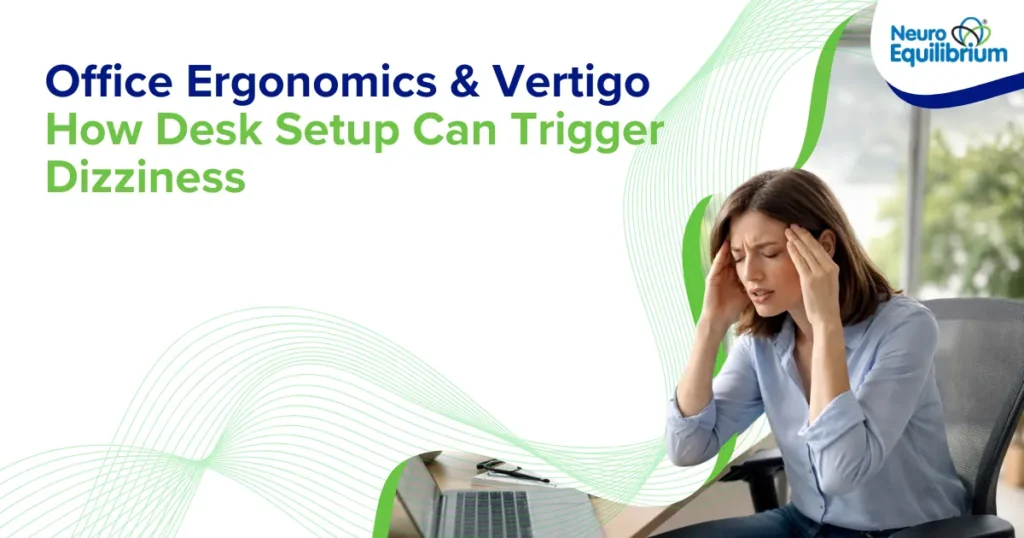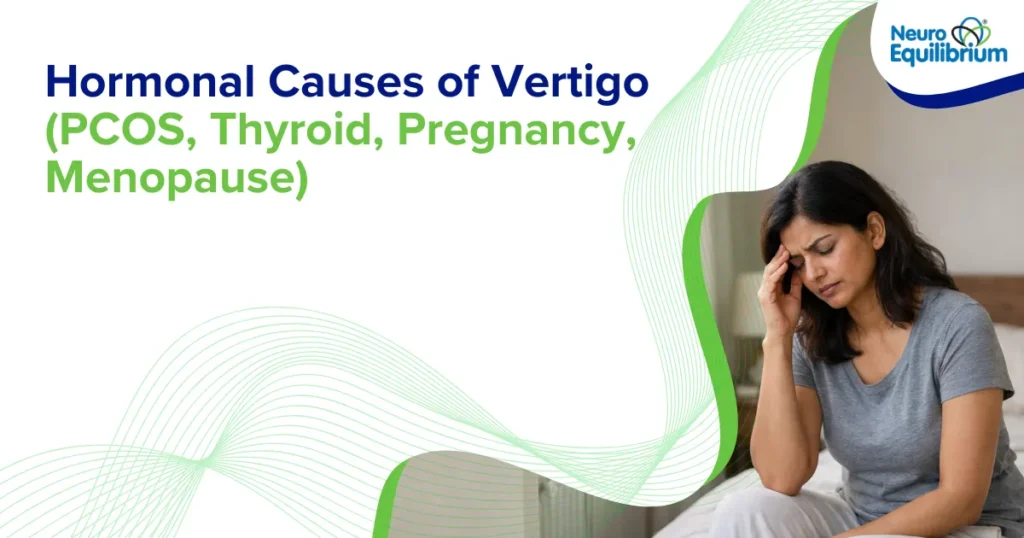Feeling dizzy, unsteady, or as if the world is spinning can be scary. Many people search for answers and come across the term “gastric vertigo.” While this isn’t a medical disease by itself, it describes a situation where digestive problems and balance issues seem connected. In many cases, people notice stomach discomfort, bloating, acidity, nausea, or vomiting alongside dizziness or vertigo. This makes it easy to assume the stomach is causing the vertigo. But the real story is a bit deeper.
Vertigo is a symptom, not a disease. It can arise from issues in the inner ear, brain, or nerves and sometimes from body chemistry imbalances that indirectly affect digestion.Let’s explore how this works in a simple, clear, patient-friendly way.
Know More About Vertigo
- Home Management of Vertigo
- Vertigo in Pregnancy: What You Need to Know
- Vertigo Treatment: Causes, Symptoms, and Medical Options
What Is Vertigo?
Vertigo refers to a false sense of spinning or rocking, even when you’re still. It occurs due to a mismatch between signals from the inner ear and the brain’s balance system (vestibular system).
Some people say:
- “I feel like I’m on a boat.”
- “The room is spinning.”
- “I can’t walk straight.”
Vertigo can appear suddenly and may be short-lived or last for hours.
So What Is “Gastric Vertigo”?
The phrase gastric vertigo is commonly used when:
- A person has gastric issues like acidity, indigestion, or bloating
- And also experiences vertigo, dizziness, or imbalance
However, the stomach is usually not the root cause of vertigo. Instead, vertigo may trigger nausea — or weakness from digestive issues may make the dizziness feel more intense.
Why They Feel Connected:
- Vertigo affects the balance centres, which can trigger nausea and vomiting.
- Digestive issues like dehydration, low sugar, vitamin deficiencies, or heavy meals can make dizziness worse.
This creates a cycle that feels like both problems are one condition.
Key Symptoms of Gastric Vertigo
Here are common complaints people experience when dealing with symptoms of gastric vertigo:
- Dizziness or light-headedness
- Feeling like the room is spinning
- Stomach bloating or gas
- Nausea or vomiting
- Sudden weakness after meals
- Headache or migraine-like pressure
- Difficulty walking steadily
- Feeling tired or “drained”
- Burping or acidity makes dizziness feel worse
These symptoms of gastric vertigo may appear occasionally or repeatedly.
Vertigo vs Gastric Vertigo
Vertigo is a very specific type of dizziness defined as the false sensation of spinning, rotation, tilting, or swaying, even when the person is standing still.
Nausea and vomiting are typically secondary symptoms that accompany a severe episode of true vestibular vertigo. They are results of the balance chaos, not the cause of the spinning sensation itself.
| Aspect | Vertigo | “Gastric Vertigo” (Dizziness Related to Stomach or Metabolic Issues) |
| Meaning | A specific feeling that you or the room is spinning or moving. | A general feeling of lightheadedness, weakness, or unsteadiness related to digestion or metabolism. |
| Cause | Usually due to inner ear balance problems or brain-related conditions. | Often caused by low blood sugar, acidity, dehydration, gas, or indigestion. |
| Main Sensation | Spinning, tilting, swaying, or rotation. | Feeling faint, uneasy stomach, tired, or heavy-headed. |
| Triggers | Turning the head, changing position, ear infections, migraines. | Skipping meals, overeating, acidity, dehydration, spicy or oily food. |
| Common Symptoms | Spinning sensation, imbalance, nausea, sometimes vomiting. | Nausea, bloating, burping, acidity, tiredness, mild dizziness. |
| Diagnosis | Requires balance tests like VNG, positional tests, or neurological evaluation. | Often diagnosed through blood sugar tests, diet history, hydration level, or digestive assessment. |
| Treatment Approach | Crystal repositioning maneuvers, Vestibular Rehabilitation Therapy, migraine management. | Dietary changes, hydration, managing acidity, stabilizing meals, treating digestive issues. |
Conditions That Link Digestion and Vertigo
Many inner ear and nerve-related conditions can cause both dizziness and nausea. Examples include:
| Condition | What Happens | Why Nausea Appears |
| Benign Paroxysmal Positional Vertigo (BPPV) | Loose crystals in the inner ear disturb balance | The sudden spinning sensation leads to nausea |
| Vestibular Migraine | Brain miscommunication triggers dizziness | The brain centre controlling the stomach gets affected |
| Vestibular Neuritis / Labyrinthitis | Balance nerve infection | Severe spinning is commonly followed by vomiting |
| Meniere’s Disease | Fluid buildup in the inner ear causes attacks | Long spinning episodes cause nausea and imbalance |
So the stomach upset is often a result of the dizziness, not the cause.
How Digestive Issues Can Trigger Dizziness
Certain digestive and metabolic factors can trigger or worsen dizziness:
| Digestive/System Factor | Effect on Balance | What Helps |
| Low Blood Sugar (Skipping meals) | Causes shakiness and dizziness | Eat regular, balanced meals |
| Dehydration | Affects the inner ear fluid and blood pressure | Drink water consistently |
| Anemia (Low Hemoglobin) | Brain gets less oxygen → dizziness | Iron-rich diet / medical treatment |
| Vitamin D, B12, or Magnesium Deficiency | Affects nerves and inner ear crystals | Supplements after testing |
Dietary Triggers for Vertigo Management
Here are some dietary factors and tips that can help with vertigo management.
| Condition | Dietary Impact | Management Strategy |
| Meniere’s Disease | Extra fluid pressure in inner ear | Reduce salt intake to stabilise ear fluid |
| Vestibular Migraine | Certain foods trigger dizziness | Avoid: caffeine, red wine, aged cheese, chocolate, MSG |
| General Dizziness | Sudden blood pressure changes | Limit excessive alcohol and caffeine |

When Should You Seek Medical Help?
See a specialist if:
- Your dizziness keeps returning
- You feel unsteady while walking
- Nausea or vomiting happens along with dizziness
- You feel ringing in the ears or hearing loss
- You have severe headaches with your dizziness
Avoid self-medication or unverified home remedies
Vertigo needs a proper diagnosis to identify and treat the root cause effectively.
Conclusion
Although gastric vertigo is not a standalone illness, many people experience both stomach discomfort and dizziness together. The key is identifying the actual cause whether it’s inner ear crystals, migraines, dehydration, or vitamin deficiencies through accurate diagnosis.
The next step to take is to seek special attention when you are having persistent symptoms of gastric vertigo, such as dizziness, nausea, imbalance, or weakness.
NeuroEquilibrium is an expert diagnostic, state-of-the-art balance testing and tailored vertigo treatment to assist the restoration of balance and confidence in everyday living.
Sources
- Naoum G., et al. (2022). Association between gastrointestinal symptoms and extragastric manifestations such as dizziness and fatigue. PMC. https://pmc.ncbi.nlm.nih.gov/articles/PMC9233578/ (PMC)
- Viliušytė E., et al. (2015). Associations between peripheral vertigo and gastro-oesophageal reflux disease (GERD). PubMed. https://pubmed.ncbi.nlm.nih.gov/26115947/ (PubMed)
- “When stomach problems and dizziness occur together.” Stomach pain and dizziness — causes & management. Medical News Today. https://www.medicalnewstoday.com/articles/stomach-pain-and-dizziness (Medical News Today)
- “Abdominal pain and dizziness: possible causes after meals or digestive distress.” Healthline. https://www.healthline.com/health/abdominal-pain-and-dizziness (Healthline)
- “Vertigo: symptoms, causes and treatments.” HealthDirect (Australian health portal) — overview of classic vertigo causes & symptoms. https://www.healthdirect.gov.au/vertigo (Healthdirect)
Can digestive problems really cause dizziness?
Yes, breakfast stomach and overall health problems may cause dizziness. Such diseases as dehydration, anemia and low blood sugar levels may decrease the blood supply or imbalance of fluids, which influences the stability of the body. Although the problems of true spinning vertigo tend to be of inner ear or brain nature, nausea and vomiting tend to accompany it and make it seem as a digestive problem. Correct assessment will enable ascertaining of the dizziness as either systemic or of the vestibular origin.
Why do I feel dizzy after eating?
Postprandial dizziness may be accompanied by increasing and decreasing the level of glucose in the blood or by the redistribution of blood to the digestive tract. Consumption of extremely sweetened food or lack of meals may result in sudden changes in the levels of blood sugar, making it lightheaded. Big meals can also help to temporarily reduce blood pressure, particularly among individuals who tend to have low blood pressure. In some cases of individuals who have the vestibular migraine, they might feel dizzy when they take certain foods.
How long does “gastric vertigo” last?
Gastric vertigo is not a medical diagnosis; the nature of the dizziness needs to be taken into consideration, and this is time-consuming. BPPV is normally intermittent and brief, as it consists of short episodes of a few seconds, whereas the vestibular migraine or Meniere’s disease is longer, up to hours. In-ear infections can make one have severe vertigo over a few days and then recover gradually. Light headaches caused by low blood sugar or dehydration can be solved soon when the underlying imbalance is resolved.
Which doctor should I consult for vertigo?
One is better to refer to a physician who may specialize in balance disorders. ENT specialists will be able to examine inner ear related conditions whereas neurologists will be able to examine dizziness which could be connected to the brain or even migraines. Clinics have been merged and experts who collaboratively diagnose and treat various forms of vertigo have been working together. By selecting the appropriate specialist, there will be an appropriate test and treatment.
Can stomach problems really cause vertigo or dizziness?
Stomach problems alone do not normally lead to spinning vertigo, although the factors related to it may aggravate dizziness. The unsteadiness or lightheadedness may occur due to dehydration, low blood sugar, anemia, and vitamin deficiencies. In the meantime, vertigo may lead to nausea and vomiting which might initially appear as a stomach problem. Treating the inner ear condition as well as general health can be used to reduce symptoms.
















